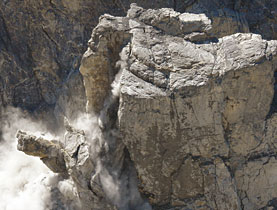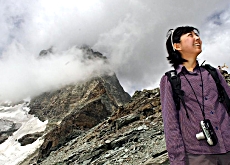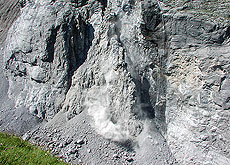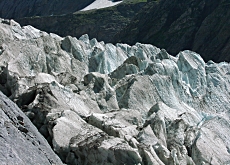Resort faces glacier flood threat

The Swiss resort of Grindelwald is facing a serious threat of flooding as a result of glacier movement on the Eiger high above it.
Government experts are hatching plans to cope in the event that a glacier lake on the mountain starts discharging large volumes of water, as is expected in the next two years.
Rockfalls from the east side of the mountain onto the Lower Grindelwald Glacier in the past two years have precipitated the chance of flooding by creating a dam effect on the edge of the ice mass – spelling danger for the ever-expanding lake that regularly forms and empties there.
“This lake now presents a more serious danger,” Urs Nigg, flood protection specialist at the Federal Environment Office, told swissinfo.ch.
“It could be much more serious than all the flooding phenomena that we normally and naturally have in the valley that leads down to Grindelwald.
“At the start we thought there could be a problem in ten years. This year we have observed that once again things are accelerating. Now we know that we must act relatively quickly.”
Rockfall
Around 50,000 cubic meters of rock fell from the east side of the mountain earlier this week. It was the first major movement of a volume of rock since the Eiger lost a fifth of a collapsing wall in 2006.
The end of the glacier is now covered by around ten metres of rock – effectively blocking an outlet for a lake of melt water that forms sporadically on the glacier and later empties. The lake expanse is growing as the glacier melts and retreats and can fill quickly during rainfall.
At the end of May 800,000 cubic metres of water from the lake spilled over, creating floods in Grindelwald. It has been empty ever since.
Rockfall on the glacier may also prevent the normal flow of melt water through passages under the ice and down the mountain.
Geological studies have shown that the unstable mass of rock is moving by four centimetres a day. New rockfalls could be triggered by tensions inside the cliff since the major incident in 2006.
“When the lake empties, it can really create a very, very big flood that at the start goes to the end of the Grindelwald plain and from there it spreads out,” warned Nigg.
“From there it could inundate all of the Grindelwald plain and affect the train station. After that it would go down the whole valley.”
After the 2006 rockfalls, a team of experts was created to come up with solutions and in recent months have come up with several hypotheses.
Two seem possible. One would be to empty the lake on the glacier by creating a channel crossing the dykes caused by the rockfalls. The other solution is, once the flood happens, to try to hold it back in the plain of Grindelwald itself.
While guidance is given by the government, it will be down to the Bern canton authorities to enforce the measures.
Big risk
A 3-D scanner has been in place to monitor the wall since 2006, run by Lausanne University’s Institute of Geometrics and Risk Analysis. Data from the scanner is then relayed to Geotest, the firm in charge of studying the situation for the government.
The expanse of unstable rock was about 400 million cubic metres at the start. An estimated 500,000 cubic metres fell dramatically in 2006.
In the latest incident, Michael Jaboyedoff’s team saw a steady stream of rockfall begin a week ago.
“It was very active and falling all the time. There is a big risk everything could collapse. We cannot say when, as it is all degrading quickly from all sides, and considering that the volume that fell is enormous,” he told swissinfo.
Jaboyedoff says the impact of the rockfall on the glacier is not yet known. He explains that if water continued to flow as normal, it would not have any repercussions, but if it stopped the passage of water a dam would be created, which in time would overflow.
Jaboyedoff says most of the unstable rock is expected to erode within two years.
“We are in a warm period, which means that the glacier has retreated. It is implicitly because of the fact that the glacier is retreating that we have these kinds of problems in the cliffs. But the cause of the instability is not directly a result of global warming.”
Glaciers are large masses of snow, ice and rock debris that accumulate in great quantities and begin to flow outwards and downwards under the pressure of their own weight.
They are formed when yearly snowfall in a region far exceeds the amount of snow and ice that melts in a given summer.
In Switzerland, glaciers play an important role as water reservoirs for hydro-power production (generating 50% of the country’s electricity). They are also considered an important tourist attraction.
Switzerland’s glaciers lost 18% of their surface between 1985 and 2000. In the Alps, the average loss has been 22%. Swiss glaciers are melting more slowly because most of them are at high altitude.
Meltdown affects smaller glaciers – which represent 18% of total glacier surface but nearly half the losses incurred – first, according to a 2004 study from Zurich University.
The Eiger, at 3,970 metres above sea level, is one of the most renowned mountains in Switzerland, with its north face offering a major challenge to climbers.
In June 2006 a rockfall blocks the main north-south road axis north of the Gotthard tunnel, killing two Germans in their car. As a result, dangerous overhanging rock has to be removed and the motorway is closed for a month.
One month later, an estimated 500,000 cubic metres falls from the eastern side of Eiger, crashing onto the Lower Grindelwald Glacier.
In May 2008, 800,000 cubic metres of water from the lake spills over, creating floods in the resort of Grindelwald. The lake has a depth of 50 metres is emptied and is being constantly measured.
In August 2008, 50,000 cubic metres of rock falls onto the glacier.

In compliance with the JTI standards
More: SWI swissinfo.ch certified by the Journalism Trust Initiative




You can find an overview of ongoing debates with our journalists here. Please join us!
If you want to start a conversation about a topic raised in this article or want to report factual errors, email us at english@swissinfo.ch.